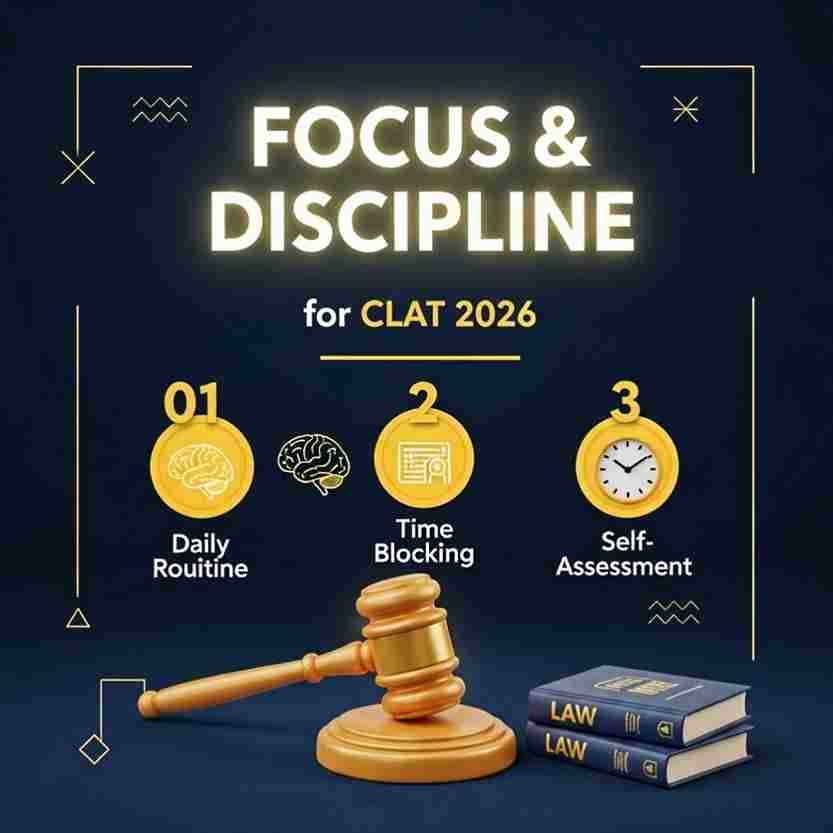
Summary
Clearing CLAT without coaching is a function of how you study, not just how much. The difference-makers are deliberate practice, predictable routines that reduce decision fatigue, and habits that train your mind to sustain attention under exam-like strain.
This guide gives research-grounded, competitor-vetted ways to sharpen focus, create lasting discipline, and turn daily effort into reliable progress.
Best CLAT Online Coaching 2026 – 2027 by NLTI
CLAT is a reading exam. Almost every section involves parsing long passages and answering inference-based questions. Losing focus for even 15 minutes can mean dropping several marks.
Consistency beats intensity. Studying 5 disciplined hours every day for a year is more effective than scattered bursts of 10 hours a day followed by fatigue.
Self-study needs accountability. Without coaching schedules, students risk falling into procrastination unless they actively impose systems on themselves.
Key takeaway: Focus ensures you make the most of each study block; discipline ensures those blocks happen every single day.
One of the biggest drains on self-study is constantly deciding what to study. Coaching removes that choice; without it, routines must do the heavy lifting.
Effective structures include:
Fixed subject order (e.g., mornings for current affairs + RC, afternoons for legal reasoning, evenings for LR and Quant).
Time-linked rituals like a 10-minute warm-up passage before diving into core study.
Weekly reflections to adjust targets without losing the larger flow.
Such systems mean less wasted mental energy. Over time, you enter a “default mode” where focus becomes automatic.
Read More :CLAT 2026 vs AILET 2026: Which Law Entrance Exam is Better for You
Many aspirants obsess over “reading faster.” In reality, CLAT rewards those who can stay accurate for two straight hours. Stamina training is more valuable than raw speed.
How to build it:
Read dense sources daily: editorials, law reviews, policy essays.
After each piece, summarize in 3–4 bullet points to check comprehension.
Practice stacked drills: RC → Legal Reasoning → Quant, without breaks, to simulate exam fatigue.
This habit builds resilience, ensuring your accuracy at the end of the test matches your accuracy at the beginning.
Mocks are the backbone of CLAT prep, but only if analyzed properly. Without coaching feedback, you must become your own examiner.
Strong mock discipline means:
Taking at least one mock weekly (increasing frequency closer to the exam).
Maintaining an error log: note question type, error reason, and correction strategy.
Revisiting only the weak patterns, not the entire paper.
Competitors highlight that growth doesn’t come from the number of mocks attempted but from depth of analysis.
Read More : How to Score 28+ in CLAT 2026 GK: Daily & Monthly Preparation Strategy
Self-study often feels isolating. Accountability keeps discipline alive.
Options include:
Peer groups: share daily goals and discuss one mock a week.
Digital trackers: Notion, Google Sheets, or even a notebook where you log progress.
Public commitments: telling a peer/mentor your weekly targets.
The point is not competition, but ensuring that missed goals are visible and corrected before they snowball.
Focus is as much about removing friction as it is about willpower. Instead of relying on self-control, restructure your environment.
Dedicated study space: one uncluttered corner used only for CLAT prep.
App/site blockers: tools like Forest, Stay Focused, or Freedom.
Pomodoro cycles: 50 minutes focused study + 10 minutes rest.
Offline mode: keep printed materials for at least one subject to reduce screen dependence.
These environmental cues tell your brain “this is study time” and cut down on wasted energy resisting distractions.
CLAT prep is not linear. Without discipline, students keep chasing “new topics” and ignore revision. A healthy mix prevents leakage.
70:30 rule → 70% time on new material, 30% on revision.
Schedule weekly GK recaps current affairs are volatile and fade quickly without reinforcement.
Revisit your error log at least twice a week to solidify corrections.
This ensures knowledge doesn’t just accumulate, it sticks.
Read More : CLAT 2026 Logical Reasoning: Master Critical Inference
Even the most structured routine collapses if the body and mind aren’t maintained. CLAT toppers consistently note the importance of lifestyle.
Sleep: 7–8 hours for memory consolidation and attention.
Exercise: 20 minutes brisk walk or yoga to sharpen cognitive function.
Mindful breaks: short breathing or meditation exercises to reset after long passages.
Nutrition: stable meals instead of sugar spikes that trigger fatigue.
Discipline is not only about books, it’s about protecting the system that studies those books.
Tracking performance helps, but too many numbers cause stress. Focus on three core indicators:
1. Mock frequency (how many full-length tests attempted).
2. Accuracy on weak areas (from your error log).
3. Average time per passage (to avoid last-minute rushing).
Each week, tie metrics to actions: e.g., if inference accuracy <70%, schedule extra RC drills. This way, measurement leads to correction, not anxiety.
CLAT prep rarely moves in a straight line. Some days your accuracy will dip, some mocks will sting, and there will be stretches where progress feels invisible. What truly defines disciplined aspirants is not how few setbacks they face, but how quickly they recover from them.
Instead of letting one bad mock spiral into a week of procrastination, anchor yourself to this mindset: progress is built on consistency, not perfection. Missing a target or underperforming once does not erase weeks of preparation; it only highlights where the system needs adjustment.
Resilience, then, is discipline in motion. The students who ultimately succeed are those who treat every stumble as feedback, not failure, and return to their schedule with quiet regularity.
Even disciplined students sometimes struggle to design systems alone. That’s where NLTI bridges the gap. Instead of spoon-feeding like traditional coaching, NLTI provides:
Curated mocks and error-focused analysis, mirroring real exam conditions.
Structured reading modules that build stamina over time.
Mentorship from NLSIU students offering accountability without the rigidity of classroom coaching.
Flexible study resources that fit directly into self-paced schedules.
For aspirants preparing without coaching, NLTI functions as a support system that sharpens focus, enforces discipline, and ensures consistent improvement.
Read More: CLAT 2026: 60-Day Smart Revision Plan for Success
1. Can I clear CLAT without coaching if I’m starting late?
Yes, but you’ll need to compress your preparation into a tighter system: daily mocks, 4–5 hours of focused practice, and aggressive error correction. Discipline matters more than start date.
2. How many hours should I study daily for CLAT?
Quality matters more than quantity. A disciplined 4–6 hours of high-focus study (with breaks) is better than distracted 10-hour sessions.
3. Should I wake up early or study late at night?
Choose whichever matches your natural rhythm, but fix it consistently. Discipline comes from predictability, not timing.
4. How do I deal with burnout during CLAT prep?
Rotate subjects, insert one rest day every two weeks, and keep short physical breaks. Burnout signals poor balance between new learning and revision.
5. What if I lose focus in the middle of a mock test?
Don’t quit practicing “reset strategies” like deep breathing for 60 seconds, then continue. Training yourself to recover mid-test is a discipline in itself.
6. Is group study better for discipline?
Peer groups help if structured, share targets, compare progress weekly, but avoid turning them into gossip zones. Accountability is the goal, not distraction.
7. How do I balance school/college with CLAT prep?
Fix two non-negotiable slots daily for CLAT. Even if short, they keep continuity. Weekends can be used for mocks and longer sessions.
8. Should I read novels to improve focus?
Optional. While novels may build stamina, editorials and non-fiction closer to CLAT themes (law, politics, economics) train more relevant concentration.
9. How do I stay disciplined when I don’t see quick results?
Shift focus from “marks improvement” to process metrics, how many error logs corrected, how many passages completed. Results will follow with lag.
10. Can I prepare with free resources alone?
Yes, if disciplined. Combine free mocks, past-year papers, and editorial reading. But supplement with structured support (like NLTI mentorship) if you find it hard to self-correct consistently.





